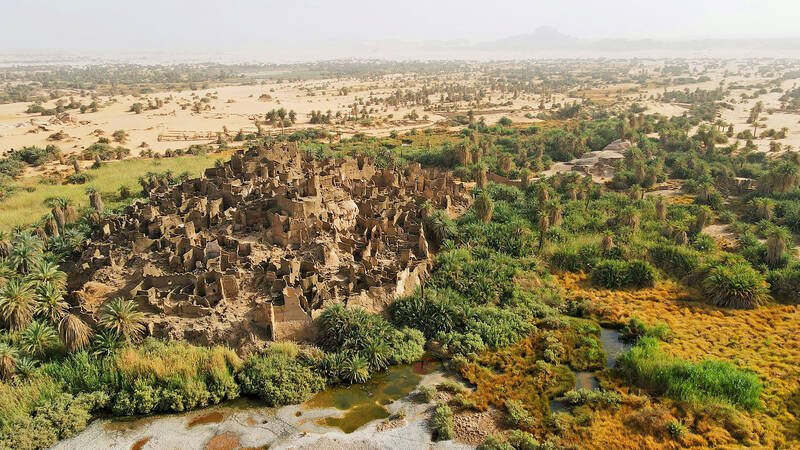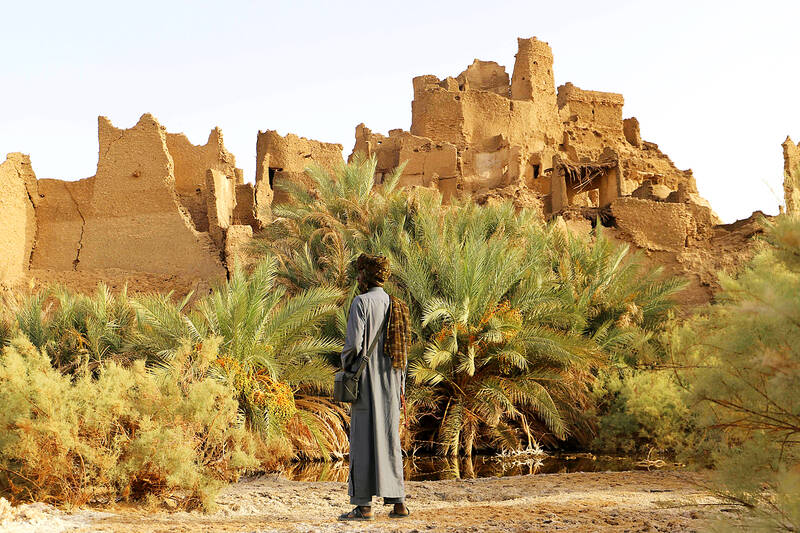A long trek across the desert of northeastern Niger brings visitors to one of the most astonishing and rewarding sights in the Sahel: fortified villages of salt and clay perched on rocks with the Saharan sands laying siege below.
Generations of travelers have stood before the “ksars” of Djado, wondering at their crenelated walls, watchtowers, secretive passages and wells, all of them testifying to a skilled, but unknown hand.
Who chose to build this outpost in a scorched and desolate region — and why they built it — are questions that have never been fully answered. Just as beguiling is why it was abandoned. No archeological dig or scientific dating has ever been undertaken to explain the mysteries.

Photo: AFP
Djado lies in the Kawar oasis region 1,300km from the capital, Niamey, near Niger’s deeply troubled border with Libya.
Once a crossroads for caravans trading across the Sahara, Kawar today is a nexus for drug and arms trafficking.
Its grim reputation deters all but the most determined traveler.

Photo: AFP
“There have been no foreign tourists since 2002,” said Sidi Aba Laouel, the mayor of Chirfa, the commune where the Djado sites are located.
“When tourism was good, there was economic potential for the community,” he said.
A blessing of sorts occurred in 2014, when gold was discovered. It saw an influx of miners from across West Africa, bringing life and some economic respite, but also bandits who hole up in the mountains.
Few of the newcomers seem interested to visit the ksars.
The mayor is careful when speaking about local history, acknowledging the many gaps in knowledge.
He said he has old photocopies in his cupboard of a work by Albert le Rouvreur, a colonial-era French military officer stationed in Chirfa, who tried without success to shed light on the origins of the site.
The Sao, present in the region since antiquity, were the first known inhabitants in Kawar, and perhaps established the first fortifications, but the time line of their settlement is hazy. Some of the ksars still standing have palm roofs, suggesting they were built later.
Between the 13th and the 15th centuries, the Kanuri people established themselves in the area. Their oasis civilization was almost destroyed in the 18th and 19th centuries by successive waves of nomadic raiders — the Tuaregs, Arabs and finally the Toubou.
The arrival of the first Europeans in the early 20th century spelt the beginning of the end of the ksars as a defense against invaders. The French military took the area in 1923.
Today, the Kanuri and Toubou have widely intermingled, but the region’s traditional leaders, called the “mai,” descend from the Kanuri lineage.
They act as authorities of tradition, as well as being custodians of oral history, but even for these custodians, much remains a mystery.
“Even our grandfathers didn’t know. We didn’t keep records,” said Kiari Kelaoui Abari Chegou, a Kanuri leader.
About 300km to the south of Djado lies the Fachi oasis, famous for its fortress and old town, with the walls still almost intact. Some symbolic sites of the ancient city are still used for traditional ceremonies.
A traditional authority of Fachi, Kiari Sidi Tchagam said that the fortress is “at least two hundred years old.”
“According to our information, there was an Arab who had come from Turkey, it was he who gave people the idea of making the fort there,” he said, echoing theories of Turkish influence.
While the ruins are a point of pride, descendants are worried the fragile salt buildings, threatened by rain, are not properly safeguarded.
Since 2006, Djado has languished on a tentative list of UNESCO World Heritage Sites.
“It’s really crucial it’s registered as a UNESCO World Heritage Site,” Tchagam said. “We are reminded of ourselves in this fort, it’s a part of our culture, [it’s] our entire history.”

A Chinese scientist was arrested while arriving in the US at Detroit airport, the second case in days involving the alleged smuggling of biological material, authorities said on Monday. The scientist is accused of shipping biological material months ago to staff at a laboratory at the University of Michigan. The FBI, in a court filing, described it as material related to certain worms and requires a government permit. “The guidelines for importing biological materials into the US for research purposes are stringent, but clear, and actions like this undermine the legitimate work of other visiting scholars,” said John Nowak, who leads field

Brazil, the world’s largest Roman Catholic country, saw its Catholic population decline further in 2022, while evangelical Christians and those with no religion continued to rise, census data released on Friday by the Brazilian Institute of Geography and Statistics (IBGE) showed. The census indicated that Brazil had 100.2 million Roman Catholics in 2022, accounting for 56.7 percent of the population, down from 65.1 percent or 105.4 million recorded in the 2010 census. Meanwhile, the share of evangelical Christians rose to 26.9 percent last year, up from 21.6 percent in 2010, adding 12 million followers to reach 47.4 million — the highest figure

Swedish campaigner Greta Thunberg was deported from Israel yesterday, the Israeli Ministry of Foreign Affairs said, the day after the Israeli navy prevented her and a group of fellow pro-Palestinian activists from sailing to Gaza. Thunberg, 22, was put on a flight to France, the ministry said, adding that she would travel on to Sweden from there. Three other people who had been aboard the charity vessel also agreed to immediate repatriation. Eight other crew members are contesting their deportation order, Israeli rights group Adalah, which advised them, said in a statement. They are being held at a detention center ahead of a

‘THE RED LINE’: Colombian President Gustavo Petro promised a thorough probe into the attack on the senator, who had announced his presidential bid in March Colombian Senator Miguel Uribe Turbay, a possible candidate in the country’s presidential election next year, was shot and wounded at a campaign rally in Bogota on Saturday, authorities said. His conservative Democratic Center party released a statement calling it “an unacceptable act of violence.” The attack took place in a park in the Fontibon neighborhood when armed assailants shot him from behind, said the right-wing Democratic Center, which was the party of former Colombian president Alvaro Uribe. The men are not related. Images circulating on social media showed Uribe Turbay, 39, covered in blood being held by several people. The Santa Fe Foundation